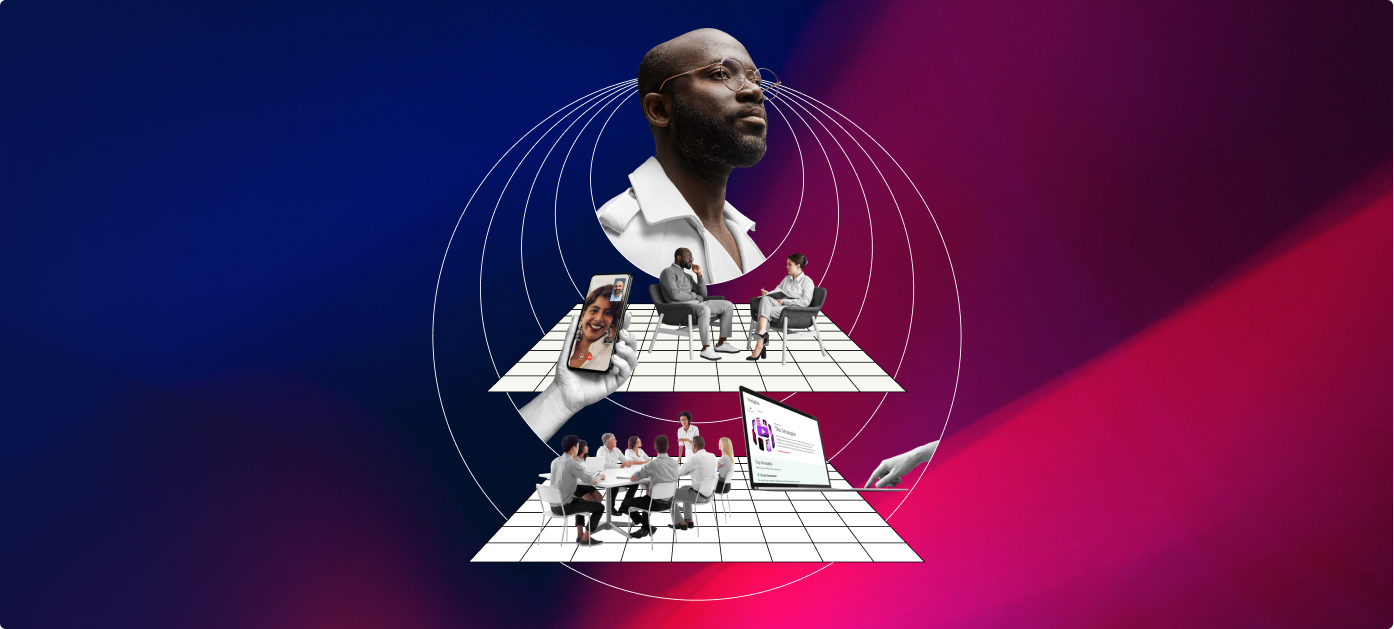AI adoption in the US is accelerating at an unprecedented rate of nearly 40%, the most rapid business technology shift in history. Organizations that successfully implement AI are seeing remarkable results:

But in the race to implement AI across organizations, there's a crucial element that many companies overlook: the human factor. While technical implementation gets considerable attention, the most powerful driver of successful AI adoption isn't found in code or algorithms—it's your managers.
The AI adoption paradox
Despite significant investments in cutting-edge AI technologies, many organizations see disappointing returns. Research shows that 77% of employees report confusion about how to effectively use AI in their careers.
This productivity paradox stems from a fundamental disconnect: the gap between AI technology implementation and human adoption isn't primarily a technical problem—it's a leadership challenge.
Our recent research, done in partnership with Stanford's Social Media Lab, tracked over 12,000 workers across 18 industries, aiming to understand how AI is transforming their work and what they need from their organizations in response.
The Pilot vs. Passenger mindset
At the heart of successful AI adoption is what we call the "Pilot mindset"—individuals with high agency and high optimism about AI. They're more likely to use AI regularly, experiment with it creatively, and critically evaluate its results rather than accepting them without question. Passengers, on the other hand, have low agency and low optimism about AI.
The impact of this mindset is substantial:
- Pilots are 3.6x more productive than their Passenger counterparts
- Pilots are 3.1x more likely to stay at your organization
- When managers have the Pilot mindset, their direct reports are nearly 3x as likely to develop this mindset themselves
Why managers matter most in AI adoption
In a business transformation that’s this sweeping, it’s inevitable that some companies will thrive in the new environment and many will struggle to catch up. So what separates the companies succeeding with AI from those failing to realize its potential? Our research shows that “Pilot managers” are, by far, the biggest lever for shifting employee mindsets about AI and ensuring a smoother transition.
When these Pilot managers demonstrate confident, optimistic engagement with AI tools, similar attitudes emerge rapidly among their direct reports—regardless of prior technical experience or initial skepticism. This multiplier effect means you can drive AI adoption in entire departments by investing in developing AI optimism and agency in management.
But this doesn’t happen overnight—or in a vacuum. In fact, the AI-ification of the workplace demands that managers change to meet the evolving needs of their direct reports

The evolution of management in the AI era
As AI capabilities expand, there’s a fundamental shift happening in what being a manager means. The majority of employees (65%) report that tracking performance and managing deadlines could be better handled by AI than human managers, but employees still strongly prefer human managers for:
-
Motivation (92% of employees)
- Listening to feedback and concerns (90%)
- Recognizing contributions (86%)
- Giving constructive feedback (85%)
- Coaching non-technical skills (85%)
While management models have traditionally focused heavily on planning, monitoring, and controlling work, the most valuable aspects of management are shifting dramatically toward coaching, development, and creating the conditions for innovation.
The challenge and the opportunity

Though the research shows how crucial managers are to the successful adoption of AI in their orgs, they are under pressure. Tapping them to take the lead on this important transformation—on top of all of their other priorities—can strain even the most ardent AI champion.
Their lack of bandwidth can mean that they default to tactical concerns and immediate deliverables rather than the strategic coaching and development work needed to help teams embrace AI. They have less capacity to model optimism and agency around technology, to create psychological safety for experimentation, or to thoughtfully guide teams through the uncertainty that accompanies technological change.
Yet paradoxically, as AI tools become more sophisticated, the need for deeply human leadership becomes more essential for the bottom line. Organizations that develop uniquely human management capabilities see impressive results, with teams showing 34% better performance, 21% more innovation, and 15% higher productivity.
Want to learn how to equip your managers with the skills they need to drive successful AI adoption?
Download our guide—"Managers: The critical catalyst for AI transformation"—to discover the specific leadership behaviors that predict whether teams will embrace AI, how to develop the Pilot mindset across your organization, and the practical steps you can take to transform management for the AI era.
Ready to test drive BetterUp’s human transformation platform designed to build AI capabilities in your managers? Request a demo today.
The Human Transformation Platform
Process doesn't change your business. People do. Our platform removes the guesswork from developing your people at scale and delivers growth that's proven, predictable, and precise.
The Human Transformation Platform
Process doesn't change your business. People do. Our platform removes the guesswork from developing your people at scale and delivers growth that's proven, predictable, and precise.











